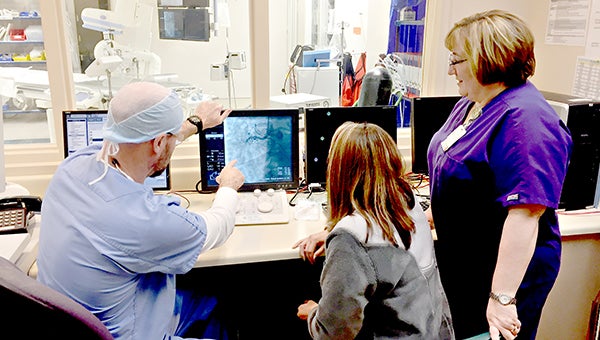Biological makeup leaves women prone to heart attack symptoms
Published 10:23 am Wednesday, February 10, 2016

- EXAMINATION: Cardiologist Paul Pierce at Merit Health looks for an angiogram for a patient with hospital staff.
Women might experience shortness of breath or nausea as a common bodily occurrence, but it could be an underlying symptom for something more dangerous.
The American Heart Association recently released a scientific statement saying women are more prone to atypical heart attack symptoms than men. Symptoms in women include the shortness or breath, fatigue, indigestion problems, anxiety, back or jaw pain.
Merit Health cardiologist Paul Pierce said from his perspective, once women become menopausal or post-menopausal, the loss of estrogen mostly affects the cholesterol, which leads to coronary artery disease. The distribution of coronary artery disease in women tends to be different from men as well.
“Your good cholesterol goes down, bad cholesterol goes up, which leads to coronary artery disease,” Pierce said.
According to the American Heart Association study, women face greater complications from attempts to restore blood flow because of small vessels and increased risk factors like diabetes and high blood pressure.
Those who try to differentiate between these symptoms as a warning sign of a heart attack or something milder will have a hard time trying to do so.
“We can’t do screenings or stress test on every women that comes in our office for every cardiac complaint,” Pierce said. “Ultimately it’s up to the patient to provide you with information to link the two together.”
Pierce said knowledge of your baseline laboratory values that put you at risk for coronary artery disease and diet and exercise are two main things women can do to get in front of heart disease. Diet and exercise serve as the first treatment options for heart disease.
“Failing that, you have things like aspirin, cholesterol lowering drugs, blood pressure control and diabetes control,” Pierce said. “Then you have a noninvasive stress test. Put them on a treadmill and see what their EKG does versus an invasive such as an angiogram or a heart catheterization.”
The heart association also stated black women have higher incidences of heart attacks than white women in all age groups. Young black women also have higher in-hospital death rates. They’re also four to five times more likely to suffer from heart disease compared to young men.
Black and Hispanic women suffer from high risk factors like diabetes, obesity and high blood pressure. Blacks are also not as likely to be referred for important treatments like a heart catheterization.
Pierce said alerting your physician about the status of your health leads to patient education.
“With the information that’s come out recently, there’s going to be a huge push for atypical symptoms to get to your doctor or cardiologist,” Pierce said. “That’s the first step in the goal of education.”





